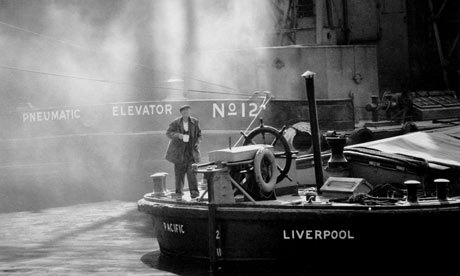"This is the most important one, because this is where I come from", says Terence Davies ahead of the Liverpool premiere of his lavishly praised documentary Of Time and the City. "I do so want them to like it."
At the Philharmonic Hall the usherettes are turned out in a grey Thunderbirds-style uniform with red trim, there is popcorn in brown bags and there is an organist in full Highland regalia. "It gives a real hint of what it used to be like in the cinema," enthuses Davies.
Boldly commissioned as part of the European City of Culture celebrations, Of Time and the City transmutes donated and archive footage from public record into a deeply private meditation on Davies' struggles with his Catholic faith and his sexuality.
There's an integrity you can't argue with about a Liverpool film that not only doesn't take kindly to The Beatles, but actively sticks its fingers in it ears at the mention of their very name. Footage of people dancing at the Cavern Club has been dubbed over with Davies reciting classical composers "with interesting European names".
Instead, Davies' film takes inspiration from Humphrey Jennings' symphonic second world war short Listen To Britain. "Jennings was trying to capture the very nature of being British and being at war, and possibly being invaded, and it captures that wonderfully," he explains, "my intentions were much more modest. To try and capture what it was like to be a Liverpudlian growing up between 1945 when I was born, and when I left, which was 1973, and then contrasting it with the new city."
Whereas Jennings' Listen to Britain centred on a nondescript Queen attending a Myra Hess recital at the National Portrait Gallery, Davies subjects the monarchy to his serenely expressed contempt, as the all-colour lavishness of Elizabeth II's coronation is pointedly contrasted with monochrome stills of Liverpool's poor. This sequence, along with Davies assertion that the Scottish fireman who commemorated the occasion by giving a firehose salute were "taking the piss", draws the first rousing cheer of the evening.
"What she really should have done was go round the kingdom, looked at how people lived, and seen how bad the slums were," explained Davies later, with an alien logic that reminds me of my own grandparents, "had she done that she would have actually fulfilled her duty, but of course, she didn't do that. All she did was just ensure that her privileges were kept, and all the privileges of the ruling classes were kept, and that is just disgraceful."
For much of the rest of the film, we watch what is rotten at the top work relentlessly to the marrow. Ignoring the unconvincing coda of the City of Culture fireworks exploding over the Three Graces, the last word spoken is 'death'. This isn't Super Lamb Banana.
Indeed, Davies is unconvinced by much of the new redevelopment. "It's all the little nooks and crannies that make a city interesting, and a lot of these have gone. The sense of community has gone, and there have been so many small losses."
Creating Of Time and the City is, you sense, one last imaginative effort to recover these small losses before saying a final goodbye to them. Almost as if to prove that you don't need the Fab Four to beatify Liverpool past and present, the film is bursting with unexpected and eccentric enthusiasms: for his mum's modest winnings on a Grand National winner called Quare Times; for the days when lord mayors got to judge beauty queens; for when footballers didn't punch the air when they scored. Of Time and the City is a séance for a lost metropolis.
The problem with this, and it's one that Davies readily admits, is that the film's strongest relationship is with an imaginary Liverpool of the past. Davies' out-of-time style allows him to nonchalantly interweave footage of the Albert Docks and Jung, but it simply looks out of date when abruptly juxtaposed to the real thing. There are several lumbering shots from the big book of visual cliches, for example, of tower blocks set to ominous music.
At a more banal level, not only is Davies' vision a particular one, but his style of narration is even more particular. It's almost certainly unintentional, but his observations can sound catty and condescending, like Uncle Monty in Withnail and I, as some critics have unkindly noted. This is surely the reason cine-essayists such as Chris Marker generally choose not to voice their own films.
Perhaps all this is why, while there were rapturous cheers when Davies, producers Roy Boulter and Sol Papadopoulos, and Culture Secretary Andy Burnham spoke before the film, by the finale, the mood in the Philharmonic Hall was more subdued. As the credits rolled, I turned to a pre-eminent local scriptwriter and asked, "Did you like it?". He very much didn't.
"I love Listen to Britain because it's greater than a documentary," explained Davies, "it's a complete poem: 19 minutes and you feel you've seen a feature." His own film is similarly rich, and while writing this I am thinking about coffins coming home from the Korean War, the most ridiculous wrestling I have ever seen, an Orange order march "howling at the Papal moon" and a child winding himself round a pelican crossing pole like a tiny, hyperactive fireman.
Just as Jennings managed to be a poet and a documentarist, both the proud keeper of officially sanctioned record and something of a subversive, it's clear that Of Time and the City is a much stronger monument to Liverpool 08 for eschewing brittle bravado.
The film lovers spilling out of the Philharmonic Hall, down Hope street, were as thoughtfully enraptured by Davies' cinematic farewell to this great northwestern city as the crowds lining the Mersey to bid the QE2 farewell the week before.









